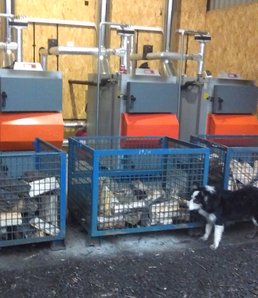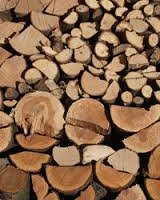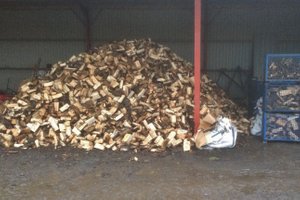Trees2Logs
Environmentally Friendly
Burning kiln dried firewood is better for the environment, you don’t need to burn as much, for a start cutting down on labour, transport and storage. When wood has a higher water content the gases in the wood can’t ignite and escape up the chimney which is further heat wasted and also causing excess soot and tar. Wood is also part of the carbon/carbon neutral cycle. The fuels produce CO2; trees absorb CO2 and store it as carbon which makes up half the weight of the tree. When the wood is burned it releases only the same amount back into the atmosphere, exactly the same as if the tree was left to rot.
What is a hardwood?
Trees defined as hardwoods are generally broad leaf varieties such as Oak, Ash, Beech, Sycamore etc.They are slower growing and more dense than softwoods. Softwood varieties are generally coniferous trees such as Pine, Spruce, etc., they grow at a quicker rate and are less dense than hardwoods.
Kiln dried’ versus ‘fresh cut’ logs
10 kiln dried logs with a water content of 25% generate the same heat output as 33 logs with a water content of around 60% (typically unseasoned wood). That’s more than three non-seasoned logs for every kiln-dried log. That means you get a hotter, more efficient fire with a third of the number of wood logs.
Hardwood versus Pine
In our opinion, both have the same calorific value after being kiln dried - ultimately the preference is yours.
Kiln dried’ versus ‘seasoned’ logs
Cleaner wood, less bark and debris to track into your home.
Can be stored in your garage or basement instead of outside.
Less creosote means fewer chimney problems and maintenance.
Weighs less – much lighter than green or even short term seasoned.
Ignites easily and burns efficiently.
Ready to burn the day it is delivered and available when you need it.
Price is comparable to seasoned firewood.
The benefits of kiln dried logs are many. The lighter kiln dried logs mean you can put more in your log basket and make fewer journeys between your wood store and stove. Kiln dried logs are very dry and much cleaner which means they are better for storing. Using fewer kiln dried logs means better control of the stove and fewer loads. The fire will burn cleaner and hotter with kiln dried logs and the stove window is unlikely to soot up. When burning on an open fire there is much less spitting and sizzling making it much safer for you and better for your chimney.
The bright flame and aromatic wood fire smell makes kiln dried logs much more aesthetically pleasing and create that real fire ambience.
The price of kiln dried hardwood logs is higher because they have had to go through a process of kiln drying but it doesn’t mean that they are more expensive.
Firewood Facts
Hardwood logs burn at a slower and steadier rate giving off a much higher and longer lasting heat from your fire. So you will not need to burn as many hardwood logs to heat your home as you would if you were burning softwood logs.
Generally softwood can 'spit' when alight, however, our pine is so dry, that we have not had any evidence of this and we burn pine constantly! This being said, we wouldn't burn soft wood unless it WERE kiln dried!




